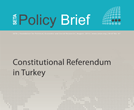Turkish politics is currently undergoing a heated political debate on the constitutional reform package (supported by Prime Minister Erdogan’s ruling party), which is on its way to a referendum this Sunday. The package includes amendments to 26 articles of the current constitution along. In addition, it would eliminate the controversial Article 15, a ‘temporary’ article that has been in the constitution since the 1980’s, preventing the prosecution of officials involved in the military coup of 1980. All in all, Sunday’s referendum is one of the ruling AK Party’s clearest challenges thus far to Turkey’s Kemalist establishment.
Since the establishment of the Turkish Republic, four new constitutions have been adopted (1921, 1924, 1961, 1982) – the latest two were drafted after military interventions – and numerous amendments have been made. Since the most recent constitution was adopted in 1982, there have been 15 amendment packages, which have affected almost half of the constitution. As such, the debate on the present constitution is not exactly a new one for Turkey, as the public is quite accustomed to constitutional changes and the public debate they generate. To understand, then, why the current package has touched off such a firestorm in Turkish society and led to an intensified political atmosphere, it is important to consider both the ramifications that the current reform efforts has for the political system in Turkey and the historical context.
Constitution Drafting as Containment of the National Will
The country’s first multiparty elections, held by secret ballot in 1950, ushered in a new era in Turkish political life by replacing the 27 year-old single party rule by the Republican People’s Party (CHP) with a government led by the Democratic Party (DP). The fact that the DP enjoyed people’s political support throughout the three subsequent national elections between 1950 and 1960 provoked a serious anxiety within the state elites, ultimately resulting in a military takeover in 1960, establishing a new system and constitution the following year.
The new political system, distrustful of populist political tendencies, enshrined a powerful bureaucracy at the center of political life. While the 1924 Constitution had up until this point maintained that the only source of sovereignty in Turkey was the nation represented by the parliament, the 1961 Constitution delimited the scale of national sovereignty to elite, authorized bodies. These civilian and military bodies included the National Security Council, the Constitutional Court, State Planning Organization and the Senate that became part of the institutional safeguards against potential social challenges to the system. In this way, the legislature and the executive branches were brought under the tutelage of a highly centralized bureaucracy.
What made this system possible was the broader Cold War strategic context, which privileged stability and security over other concerns. Both the center-right and center-left political parties disregarded the general public’s broader political demands, pursuing policies limited to economic development and welfare. As long as they kept their distance from the ethnic and religious fault lines of the society at large, the political parties found support from the bureaucracy for accepting the rules of the game, and as long as they kept their focus on social welfare, they were able to enlist enough support from the population as a whole.
Bureaucratic Tutelage over the Political System
The political system of the early 1990s displayed similarities to this social/political arrangement in terms of encountering the same issues of popular expression reflected into the political realm–but with one key difference. This time, the bureaucratic tutelage, which maintained its dominance for decades due to the security considerations of the Cold War era, began to unravel – indeed, the longtime suppression of Turkish civil society for the stabil
In this article
- Domestic Policy
- 1921
- 1924
- 1950
- 1960
- 1961
- 1980
- 1982
- 1990
- Cold War
- Constitutional
- Elections
- in
- Kemalism
- of
- Prime Minister
- Prospects
- Recep Tayyip Erdoğan
- Reform
- SETA
- The President of the Republic of Türkiye
- Turkish President
- Türkiye's Democratic Party (DP)
- Türkiye's Justice and Development Party | AK Party (AK Parti)
- Türkiye's Republican People's Party (CHP)


